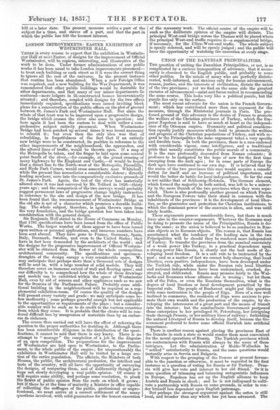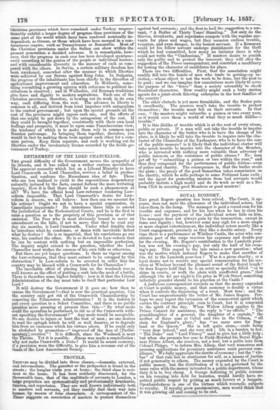UNION OF THE DANITBIAN PRINCIPALITIES.
TICE question of uniting the Danubian Principalities, or not, is so complicated by a curious transposition of advocacy, that it neces sarily is obscured to the English public, and probably to some other publics. In the minds of many who are perfectly disinte rested, well-informed, and anxious only for human advancement, reason, justice, and the interests of civilization, dictate the union of the two provinces ; yet we find on the same side the greatest enemies of advancement—saint and Satan united in recommending the same course. This looks very like a political puzzle, but the puzzle lies only on the surface.
The most recent advocate for the union is the French Government; which has contributed more than one argument for the measure, through the Ministerial journals in Paris. The professed ground of this advocacy is the desire of France to promote the welfare of the Christian provinces of Turkey, which the Emperor Napoleon is said to have as much at heart as the independence of the Ottoman empire. Humanity and political consideration equally justify measures which tend to promote the welfare and progress of the Christian populations of Turkey, and with regard to the Principalities the same argument takes a very specific and forcible turn. In both the provinces, there is a race endowed with considerable vigour' some intelligence, and a traditional pride that usually constitutes the public morals of a community.. It is the race professedly descended from Roman colonists ; it professes to be instigated by the hope of now for the first time emerging from the dark ages ; for in some parts of Europe the dark ages have continued to our own day. It is believed that by the union of the two provinces this race would acquire a oonsolidation for itself and an increase of political importance, and would the better do battle for local independence. So far the case is not unlike that of Schleswig-Holstein. The German element, which formed the majority in both united, was left to be a minority in the more Danish of the two provinces when they were separated. There is also professedly another ground on which France and the European Powers take their stand in common with the inhabitants of the provinces : it is the development of local liberties as the guarantee and protection for Christian institutions, to which the dominant power of the suzerain is alien, and was until lately hostile.
These arguments possess considerable force, but there is much force also in the counter-arguments. Whatever the Roumans may be doing to promote the union of the Principalities, Russia is doing the same ; so the union is believed to be as conducive to Russian objects as to Rouman objects. The reason is, that Russia has ascertained what the tendency of the leading men in the two Principalities will be should they be rendered more independent of Turkey. To transfer the provinces from the nominal suzerainty of a weak power like Turkey, to a practical dependence upon a strong power like Russia, is clearly not the best mode of 'developing local freedom. It is a safe rule to be instructed by the past ; and as a matter of fact we cannot help observing, that local liberties, even positive independence, have been developed under the Turkish rule, while under the Russian rule local liberties and national independence have been undermined, crushed, destroyed, and obliterated. Russia may promise fairly to the Wallachs and Roumans whose alliance she is wooing ; but let them ask of the Poles, or even the Russians themselves, what is the degree of local freedom or local development permitted by the Imperial rule. The people of Bucharest might put this question with some instruction to the people of Riga. Born of a race well inclined to commerce, the residents of Riga were anxious to promote their own wealth and the production of the empire, by developing the intercourse of a great port and the means of transit into the interior; but the semibarbaric Government postponed those enterprises to her privileged St. Petersburg, her intriguing trade through Prussia, or her military lines of railway ; forbidding the natural Liverpool of Russia to develop itself, because the Government preferred to foster some official Harwich into artificial importance. ere is another reason against placing the provinces East of the Danube in such a state as would render them most convenient for the moral operations of Russia. The Turkish provinces which are conterminous with Russia will always be the scene of these intrigues. Let the administration of Moldo-Wallachia be " settled " satisfactorily to Russia, and the same questions would instantly arise in Berne, and Bulgaria. With respect to the grouping of the Powers at present favourable to the junction or otherwise, it must be regarded in the first instance as a question of voting for Russia or for Turkey. Prus sia will give her vote and interest to her old friend. Or it is some question of trimming and balancing antagonistic influences in Europe. Napoleon has set up the English alliance to keep Austria and Russia in cheek ; and he is not indisposed to cultivate a partnership with Russia on some grounds, in order to render himself less dependent upon English patronage. But perhaps the strongest argument against the union is still local, and broader than any which has yet been advanced. The
Christian provinces which have remained under Turkey unquestionably exhibit a larger degree of progress than provinces of the same part of the world which have been rendered nominally independent, as Greece, or those which have been merged in a conterminous empire, such as Transylvania or Bessarabia. Most of the Christian provinces under the Sultan can show within the present generation a decided advance. It is remarkable, however, that the progress in each case has been developed spontaneously according to the genius of the people or individual leaders, and, with considerable diversity' in the manner of each as compared with the others. In Servia a certain military freedom has been awakened, somewhat after the manner in which liberties were achieved by our Barons against King John. In Bulgaria, the progress of the inhabitants has been chiefly in the direction of agricultural improvement and education. In Moldavia, something resembling a growing opinion with reference to political institutions is observed ; and in Wallachia old Rouman traditions give force and dignity to modern aspirations. Each one of the Christian provinces, therefore, is hewing out its work in its own way, each differing from the rest. The advance in liberty is common to all, and derived from local impulses with antagonism to the central government; but upon the special grounds all the rest of the provinces might oppose each one: and the efforts of that one might be put down by the antagonism of the rest. If they could be brought together, consistently with their own local feelings and prospects, it must be upon some Pansclavonian view, the tendency of which is to make them rely in common upon Russian patronage. In bringing them together, therefore, you would in fact be making them tools against each other for a common patron. Keep them separate, and each is working out its liberties under the involuntary licence accorded by the feeble government of Turkey.



























 Previous page
Previous page